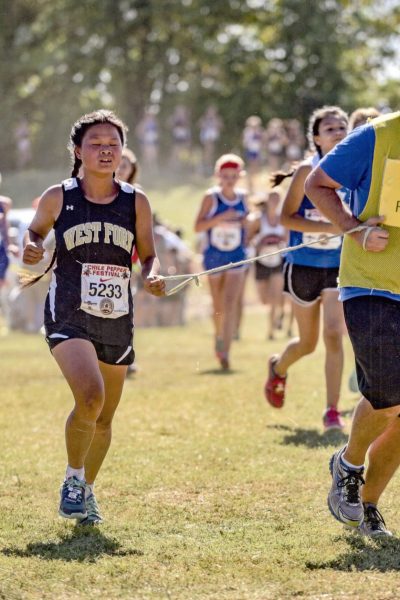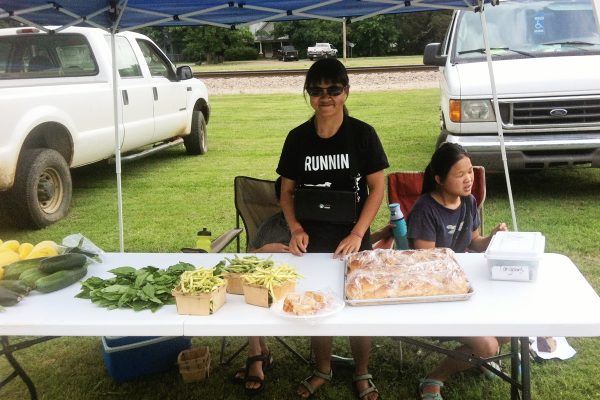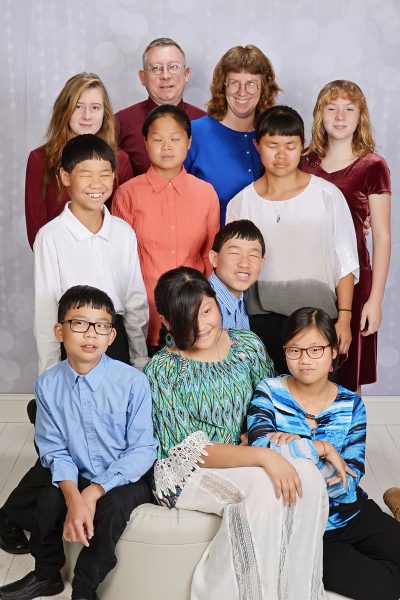J: “Mom, we did four mile repeats today! I ran them all about 6:20.”
Me: “Well, can I expect to see a 21 minute 5K on your next race?”
J: “Mom, we got to rest five minutes between repeats. You know a race isn’t like that. Oh, and my agricultural instructor wants me to talk to a bunch of college students who are touring the school tomorrow. He wants me to talk about my stall at the farmer’s market this summer and how I made my FFA project goal in one year. Should I talk about the bread I baked as well as the vegetables?”
Me: “Well, the bread was a big part of your earnings, so I think you should definitely talk about it.”
J: “Okay. He wants me to be part of the Beef Quiz Bowl and parliamentary team for FFA too. We have to be at school early tomorrow; I have a practice for All-Region choir tryouts. I just don’t know how I’m going to get everything done!” Dramatic sigh.
R: “Mom, I have two permission slips for you to sign. Our AP World History class is going to an art museum in two weeks, and there is a group touring Arkansas Tech next week that I want to go with. Can you quiz me on my Spanish vocabulary after supper? I have a test tomorrow. And can you do a quick check and make sure I downloaded all the assignments for my Psychology class? There are usually two, and I only found one.”
This is not a brag on how accomplished and busy my kids are. This was pretty much a verbatim conversation that I had with them after picking my two tenth grade daughters up from cross-country practice several weeks ago.
Only the last sentence might tip you off that both of them are blind.
R and J were adopted at ages seven and nine, and have lived in America for eight years. They have both been blind from birth. As you can probably tell from the conversation, blindness doesn’t cause us much concern. Blindness is just an inconvenience.

Both J and R are fully mainstreamed and take advanced courses with other student in their school. They run on their school’s cross country and track teams with guide runners. They participate in other extracurricular activities such as FFA, Spanish club, assisting worship at our church, choir, and piano lessons. They garden, bake, knit, hike, and read for recreation.
J and R both use a device called a braille notetaker, which allows them to read most electronic documents in braille.
They can use their notetakers to access email, text on their phone, write documents, get on the internet (and Facebook)…all the normal things most people use their computers for. It does have some limitations because many password protected sites or sites controlled by Google applications are inaccessible. For those sites, they use a laptop with a screen-reader. They switch back and forth throughout the day with whatever piece of technology will work the best for their current assignment. R is fairly accomplished at using a computer with a screen-reader to access her remote learning class, but occasionally she needs help making sure she has found all of the assignments.
It hasn’t always been as easy as the previous paragraphs may make it seem. They were pulled out daily from regular classes for years. They took lessons in braille, screen-reader technology, and orientation and mobility. This year when their high school went to an entirely computer-based curriculum, the learning curve to navigate the system was steep. They were incredibly frustrated.
For the first couple of weeks, while other students were logging on and working on their assignments, J and R were spending their entire class periods just trying to find their way around the new system with a tab button and a screen-reader. They were falling behind their classmates because they couldn’t get to their assignments with the new interface. They cried every night the first week about how hard it was for them versus sighted students.
These are realities that blind people have to cope with:
– websites that are completely inaccessible to screen-readers
– educational sites that while nominally accessible are very unfriendly for anyone who can’t see a mouse
– and teachers who don’t get the difficulties a blind student may experience when trying to read their visually appealing, graphic-heavy powerpoint
However, these difficulties are part of life. J and R have learned how to deal with their new curriculum interface. It wasn’t fun, but they gained valuable computer skills in the process that will help them when they are in college and in the workforce. They now teach their former braille teachers shortcuts in navigating a computer non-visually.
Even more importantly, they have learned to advocate for themselves.
They have the confidence to go to a teacher and explain what they need and how to modify an assignment so they can access it. This ability to advocate for themselves is perhaps the most difficult skill they have mastered, and it is vital for their next stage of life.

They are starting to think seriously about careers and college. J is trying to decide between possible careers in botany since she loves plants, or perhaps speech pathology, because she also enjoys working with young children.
R is thinking about going back to China as a rehabilitation teacher for blind adults. She enjoys teaching, but with older teens and adults, not children. They have a rehabilitation counselor from our state agency for the blind who is working with them on career choices, and any other independent living skills they may need. The same state agency will pay for their specialized equipment when they go to college and help with tuition.
They have the same concerns other kids have about going to college:
Am I making the right career choices for me?
Can I do the work?
Will I make new friends?
Will the computer platforms their classes be on be accessible?
Will my professors be willing to modify assignments if needed to make them accessible?
Will my textbooks arrive in time?
R is contemplating the best time to get a guide dog… before or after the summer internship she already has set up in Hong Kong with a blind school after her senior year?
Almost all colleges have a department of accessibility, interviewing with them to see how open they are to working with blind students is critical when considering a college.
Public transportation is also an issue to be considered. They want to select a college with a good transportation system so they can travel independently. They want to be able to use fixed route buses, which are much cheaper than taxis and much more conducive to spur of the moment plans than most special transportation for the disabled. We refer to buses, Uber, taxis, etc as “renting eyesight” to soften the sting that driving is one of the few things they can’t do.
As their mother, I am not worried. I know they will succeed. They will have more challenges than the average college freshman, but they have the skills they need to overcome them. They have greatly benefited from the mobility and technology training they have received in public school.
They can travel where they want with GPS and their white canes. They know how to ride buses, and have traveled across country on airplanes by themselves. They can use their braille notetakers and screen readers to access most websites, and they know how to advocate for themselves if an assigned website is not accessible.
They have learned to persevere through difficulties and work through technological challenges.
But most importantly, they think they are capable.

They are not afraid to set high goals and work to achieve them. They have changed many people’s vision in our school and town about what blind people can accomplish. I have no doubt they will continue to change opinions wherever they go. They aren’t going to be stopped from creating what they want for their lives merely for an inconvenience.
You can read some news articles written about the girls here and here.
– guest post by Valleta

























Such inspiring and amazing children!
We used the Suzuki method (which emphasizes learning by ear). Hadley School for the Blind gives free, on-line classes in braille music for when kids are older. They must be able to figure fractions, so usually no earlier than 6th grade.
I would love more information about music lessons for those with vision impairments? Any links you can recommend?
Great story! I live in Fayetteville and grew up not too far from West Fork!